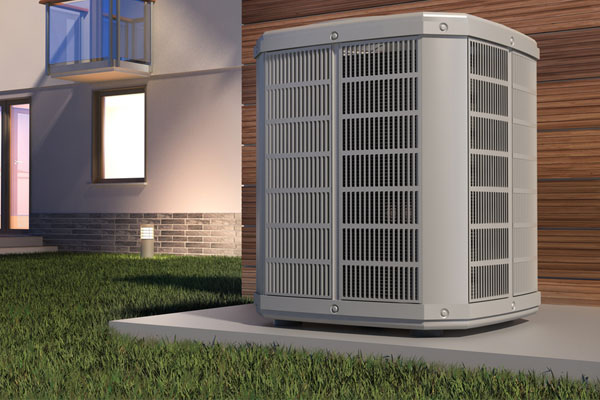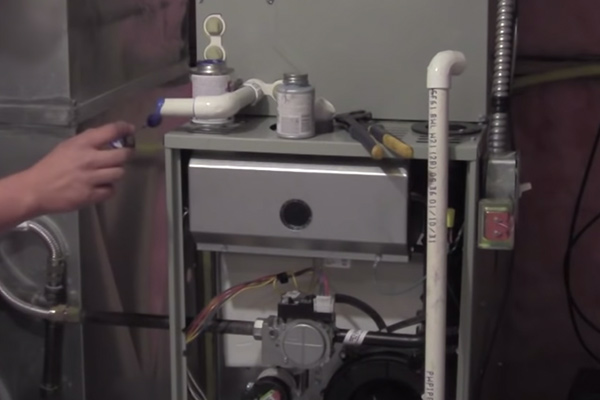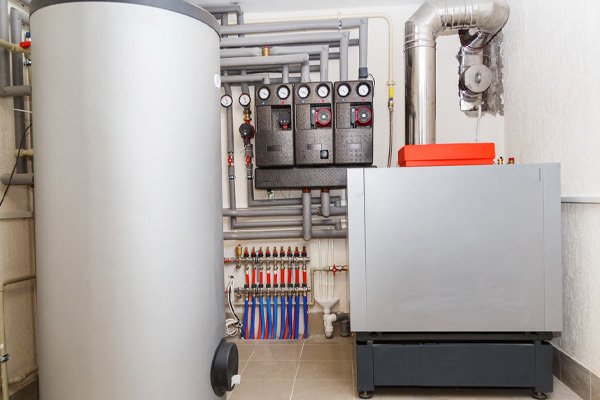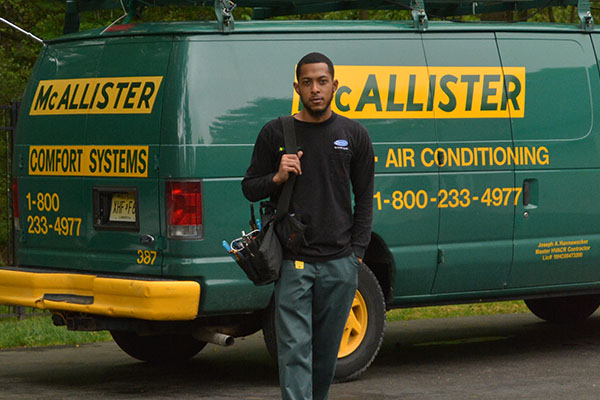Dual Fuel Heat Pump: How Does It Work?

A dual fuel heat pump is an innovative heating system that combines the efficiency of an electric heat pump with a backup gas or oil furnace or boiler. It offers homeowners a versatile solution for optimal comfort year-round. In today’s world, where energy efficiency and adaptability are paramount, the hybrid heat pump is a wise choice for maintaining a comfortable indoor environment while minimizing energy consumption and environmental impact.
What is a Heat Pump?
Contents
A heat pump is a type of heating and cooling system that transfers heat from one place to another to warm or cool a space. It works by moving heat rather than generating it. It is an energy-efficient option for both heating and cooling. The most common types of heat pumps are:
- Air-Source: Pulls heat from the air, economical and versatile.
- Water-Source: Uses nearby water for heat exchange, efficient with water access.
- Geothermal: Taps into earth or groundwater temperatures, very efficient with higher initial costs.
The Dual Fuel Concept and the Hybrid Heat Pump
The dual fuel concept is often implemented through a hybrid heat pump system. It is an innovative approach to heating and cooling. It combines the energy-efficient benefits of an electric heat pump with a backup combustion heating system, typically gas or oil. This hybrid system allows homeowners to optimize heating efficiency while maintaining comfort and adaptability in varying weather conditions.
Compared to traditional heat pumps that rely solely on electricity, hybrid heat pumps offer distinct advantages:
- Enhanced Efficiency: In moderate climates, hybrid heat pumps operate in electric mode. It capitalizes on their efficiency. However, when temperatures drop, the system can switch to backup combustion heating, which is more effective in extreme cold.
- Versatility: Dual fuel systems provide adaptability by automatically selecting the most cost-effective energy source based on outdoor temperature. This versatility helps keep the system efficient throughout the year.
- Cost Savings: By using electricity when it is most efficient and switching to gas or oil during extreme cold, hybrid heat pumps can reduce energy costs compared to traditional electrical heat pumps.
- Reduced Environmental Impact: Dual fuel systems can be more eco-friendly, relying on natural gas or oil for heating only when necessary. It minimizes the user’s carbon footprint.
Components of a Dual Fuel Heat Pump
- Heat Pump Unit: This is the heart of a dual fuel system, acting as both a heater and air conditioner. It efficiently harvests heat from the outside air to heat the home and expels indoor heat outside for cooling, offering year-round climate control.
- Backup Combustion Furnace or Boiler: Powered by natural gas or oil, this furnace or boiler is a secondary heat source, providing necessary warmth when the heat pump is less effective due to extreme cold.
- Thermostatic Control: This component switches between the heat pump and furnace or boiler, depending on the outdoor temperature, ensuring energy-efficient operation and consistent indoor comfort.
How Does a Dual Fuel Heat Pump Work?

A dual fuel heat pump operates based on the principle of optimizing energy efficiency by switching between two heating systems: the electric heat pump and the combustion furnace or boiler. They switch depending on outdoor temperatures.
Heat Pump Mode in Mild Temperatures
When outdoor temperatures are moderate, the dual fuel heat pump operates in heat pump mode. It extracts heat from the outdoor air, even in cold conditions. It then transfers the heat indoors to heat the building. Heat pump mode is highly energy-efficient. It is the primary choice for heating during mild weather.
Combustion Furnace or Boiler Mode in Colder Temperatures

The dual fuel system automatically switches to combustion furnace or boiler mode when outdoor temperatures drop significantly. The heat pump’s efficiency declines in extreme cold, making the backup furnace or boiler more effective at providing heat. The combustion furnace or boiler is usually powered by natural gas or oil. It takes over to deliver reliable heating to provide indoor comfort in severe weather conditions.
Benefits of Having Both Systems in One
- Energy Efficiency
- Adaptability
- Energy Cost Savings
- Less Environmental Impact
Advantages of Dual Fuel Heat Pumps

Dual fuel heat pumps offer several advantages, including the following:
Cost Savings
Dual fuel heat pumps offer significant cost savings due to their efficient operation in different conditions. This leads to reduced energy usage and lower utility costs. The system’s dynamic heating approach optimizes cost-effectiveness, making it an economical choice.
Flexibility
Dual fuel heat pumps are highly adaptable to varying temperatures. Their ability to switch between the heat pump and combustion furnace or boiler modes allows homeowners to experience consistent indoor comfort throughout the year. This flexibility is particularly valuable in regions with fluctuating weather patterns. The system automatically adjusts to maintain the desired indoor temperature.
Environmental Benefits
Dual fuel heat pumps contribute to environmental sustainability by reducing the carbon footprint and lessening fossil fuel usage. The system relies on electricity and extracts heat from the outdoor air. This makes it an energy-efficient and eco-friendly choice. Using the combustion furnace or boiler only in extreme cold minimizes the overall environmental impact while providing essential heating needs.
Extended Equipment Lifespan
Dual fuel heat pumps extend the lifespan of eating equipment. Since the system shares the heating load between the heat pump and the combustion furnace or boiler, wear and tear are distributed more evenly. This reduces the stress on any system and prolongs the lifespan of the entire heating system, saving homeowners on repair and replacement costs.
Considerations Before Installing A Hybrid Heat Pump
Before choosing and installing a hybrid heat pump, consider the following factors.
- Climate: Assess whether your location is suitable for a dual fuel system. Hybrid heat pumps are most advantageous in regions with varying temperatures. If your area experiences freezing weather, the backup combustion furnace or boiler will be particularly beneficial.
- Existing Systems: Consider how a hybrid heat pump will integrate with your current HVAC equipment. Make sure that the installation and compatibility won’t cause any conflicts or inefficiencies with your existing systems.
- Initial Costs vs. Long-Term Savings: Evaluate the initial investment required for a hybrid heat pump system. While this system may be more expensive upfront compared to traditional systems, consider the potential long-term savings on energy bills. The cost-efficiency of the system over time should be a key factor in your decision.
- Sizing and Professional Assessment: Make sure the system is appropriately sized for your home. A professional assessment of your heating and cooling needs is crucial. An HVAC specialist can accurately determine the right size and capacity of the system to provide efficient heating and cooling without overworking or underperforming.
Maintenance & Upkeep Of The Hybrid Heat Pump

For peak performance and extended life of a hybrid heat pump, regular professional maintenance is essential. Yearly servicing spots and resolves issues to ensure efficient operation.
Challenges like sensor failures, refrigerant leaks, or furnace or boiler troubles can arise in hybrid heat pumps. Consistent maintenance by certified HVAC technicians can detect these early for swift fixes, averting bigger problems.
Commitment to regular care is key to maintaining the efficiency of a hybrid heat pump. Servicing keeps components clean and functional, minimizes wear and tear, and supports optimal operation of both the heat pump and backup furnace or boiler, cutting down on energy use and expenses. Such diligence also prolongs the system’s lifespan, saving on replacement costs.
Conclusion
The dual fuel heat pump offers versatility and cost savings. Homeowners should explore such efficient options, embracing modern solutions for comfort and environmental sustainability. By switching to dual fuel heat pumps, homeowners can not only stay warm and cozy but also contribute to a greener and more economically sound future.
Call McAllister Energy For All Of Your HVAC Requirements

McAllister Energy is the leading provider of heating and cooling services in southern New Jersey. Our team comprises highly skilled and certified technicians specializing in HVAC tune-ups, repairs, installations, and replacements. We take pride in delivering top-quality services to all our clients.
At McAllister Energy, we understand the importance of having a comfortable and energy-efficient home. That is why we offer competitive pricing for our services. Our maintenance services are designed to enhance comfort and reduce energy bills. If you require an HVAC repair or replacement, our knowledgeable technicians can recommend the best option while keeping your budget in mind. We stand behind our work and offer a satisfaction guarantee.
To schedule a service appointment with us, simply give us a call. We offer free, in-home estimates to help you make informed decisions about your HVAC systems. You can trust McAllister Energy to provide exceptional heating and cooling services that will exceed your expectations!
You can click here to contact us now or call us at (856) 665-4545 to find out more! Click the link to view our service area.
Related Articles: